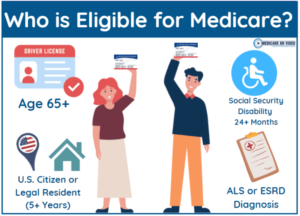 Medicare eligibility is determined by age and certain qualifications. Most individuals become eligible for Medicare at the age of 65. However, it’s important to note that Medicare eligibility is not tied to the retirement age for Social Security benefits. While a person can apply for full retirement income benefits at around age 67, this does not impact their eligibility for Medicare. Regardless of retirement status, the normal age for Medicare eligibility remains 65. To qualify for Medicare coverage, individuals must be U.S. citizens or permanent residents who have lived in the country continuously for at least 5 years.
Medicare eligibility is determined by age and certain qualifications. Most individuals become eligible for Medicare at the age of 65. However, it’s important to note that Medicare eligibility is not tied to the retirement age for Social Security benefits. While a person can apply for full retirement income benefits at around age 67, this does not impact their eligibility for Medicare. Regardless of retirement status, the normal age for Medicare eligibility remains 65. To qualify for Medicare coverage, individuals must be U.S. citizens or permanent residents who have lived in the country continuously for at least 5 years.
When can I first enroll in Medicare?
3 Months before your 65th birthday and 3 months after. Most people are eligible for Medicare at age 65. There is a 7 month window called the initial Enrollment Period where you can enroll into Medicare.
IF you are below the age of 65, there are additional conditions under which you may be eligible for Medicare:
1. If you have a permanent disability and have been receiving Social Security disability income benefits for a period of 24 months.
2. If you are diagnosed with end-stage renal disease, commonly known as kidney failure, and require dialysis or are awaiting a kidney transplant.
3. If you have been diagnosed with Amyotrophic Lateral Sclerosis (ALS), also referred to as Lou Gehrig’s disease.
Eligibility for Medicare Part A
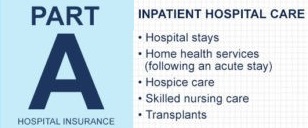 At the age of 65, you become eligible for Medicare Part A if either you or your spouse has legally worked in the United States for a minimum of 10 years. Throughout those years, you have contributed taxes towards your Part A hospital benefits. This is the reason why most Americans do not have to pay any premiums for Part A once they become eligible for Medicare. Part A primarily provides coverage for your hospital stays. If you have not worked the required 10 years to qualify for Medicare Part A without cost, you have the option to purchase it. To determine the cost, you can get in touch with Social Security. In the event that you need to purchase Part A, the coverage will amount to $505 per month. However, there are cases where partial premiums are applicable for individuals who have worked for over 30 but less than 40 quarters. If you have already enrolled in Social Security income benefits, you may be automatically enrolled in Part A (and Part B) when you turn 65. Your Medicare card will typically arrive in your mailbox approximately 4 to 6 weeks prior to your 65th birthday.
At the age of 65, you become eligible for Medicare Part A if either you or your spouse has legally worked in the United States for a minimum of 10 years. Throughout those years, you have contributed taxes towards your Part A hospital benefits. This is the reason why most Americans do not have to pay any premiums for Part A once they become eligible for Medicare. Part A primarily provides coverage for your hospital stays. If you have not worked the required 10 years to qualify for Medicare Part A without cost, you have the option to purchase it. To determine the cost, you can get in touch with Social Security. In the event that you need to purchase Part A, the coverage will amount to $505 per month. However, there are cases where partial premiums are applicable for individuals who have worked for over 30 but less than 40 quarters. If you have already enrolled in Social Security income benefits, you may be automatically enrolled in Part A (and Part B) when you turn 65. Your Medicare card will typically arrive in your mailbox approximately 4 to 6 weeks prior to your 65th birthday.
Eligibility for Medicare Part B
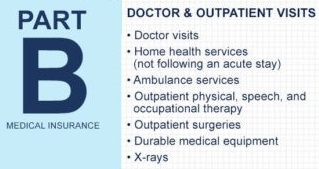 At the age of 65, you become eligible for Medicare Part B as well. However, it is important to note that you will be required to pay a monthly premium for Part B. This particular plan covers outpatient benefits such as doctor visits, lab work, surgery fees, and more. For a detailed understanding of what Part B covers, we recommend visiting our Part B page. It is worth mentioning that some individuals who are turning 65 may still have health insurance through their employer. In such cases, they have the option to delay their enrollment into Part B and continue with their group health insurance without worrying about any late penalties. If you do decide to delay your enrollment into Part B, we strongly advise consulting with an insurance agent who specializes in Medicare. They will be able to guide you through the special election periods that you must utilize in the future to avoid any late enrollment penalties.
At the age of 65, you become eligible for Medicare Part B as well. However, it is important to note that you will be required to pay a monthly premium for Part B. This particular plan covers outpatient benefits such as doctor visits, lab work, surgery fees, and more. For a detailed understanding of what Part B covers, we recommend visiting our Part B page. It is worth mentioning that some individuals who are turning 65 may still have health insurance through their employer. In such cases, they have the option to delay their enrollment into Part B and continue with their group health insurance without worrying about any late penalties. If you do decide to delay your enrollment into Part B, we strongly advise consulting with an insurance agent who specializes in Medicare. They will be able to guide you through the special election periods that you must utilize in the future to avoid any late enrollment penalties.

Eligibility for Medicare Part C
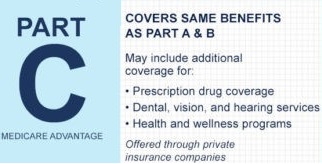 Medicare Advantage, also known as Medicare Part C, offers an alternative way to receive your benefits through a private insurance company instead of relying solely on Original Medicare. These plans typically have smaller networks compared to Medicare, but some of them also provide Part D coverage. In order to qualify for Part C, you must first be enrolled in both Medicare Parts A and B. Additionally, you need to reside within the service area of the plan you wish to enroll in. It is important to note that enrolling in a Medicare Advantage plan does not exempt you from paying Part B premiums or allow you to drop Part B altogether. To be eligible for either a Medicare Advantage plan or a Medigap plan, you must maintain enrollment in both Parts A and B throughout the duration of your Medicare Advantage plan coverage.
Medicare Advantage, also known as Medicare Part C, offers an alternative way to receive your benefits through a private insurance company instead of relying solely on Original Medicare. These plans typically have smaller networks compared to Medicare, but some of them also provide Part D coverage. In order to qualify for Part C, you must first be enrolled in both Medicare Parts A and B. Additionally, you need to reside within the service area of the plan you wish to enroll in. It is important to note that enrolling in a Medicare Advantage plan does not exempt you from paying Part B premiums or allow you to drop Part B altogether. To be eligible for either a Medicare Advantage plan or a Medigap plan, you must maintain enrollment in both Parts A and B throughout the duration of your Medicare Advantage plan coverage.
Eligibility for Medicare Part D
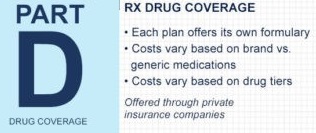 You can qualify for Medicare Part D as long as you are currently enrolled in either Part A and/or B. Additionally, you must reside within the service area of the Part D plans. While Medicare Part D is not mandatory, we highly advise enrolling in it if you do not have any other prescription drug coverage. Part D offers insurance against high medication costs in the future and can also reduce your current copayments for medications. It is important to note that if you choose not to enroll in Part D and lack any other credible coverage, you may face late penalties when you decide to enroll at a later date.
You can qualify for Medicare Part D as long as you are currently enrolled in either Part A and/or B. Additionally, you must reside within the service area of the Part D plans. While Medicare Part D is not mandatory, we highly advise enrolling in it if you do not have any other prescription drug coverage. Part D offers insurance against high medication costs in the future and can also reduce your current copayments for medications. It is important to note that if you choose not to enroll in Part D and lack any other credible coverage, you may face late penalties when you decide to enroll at a later date.
Commonly Asked Questions.
Who qualifies for Medicare before the age of 65?
The eligibility criteria for Medicare have expanded beyond individuals aged 65 and above. The following categories of people can now also be eligible, as mentioned earlier:
1. Individuals who receive Social Security disability income benefits for 24 months will be automatically enrolled in Medicare during the 25th month.
2. People who receive Social Security disability income benefits and are diagnosed with Lou Gehrig’s disease will be enrolled in Medicare during the first month.
3. Individuals undergoing kidney dialysis or kidney transplant patients are eligible for Medicare. The commencement of these benefits will vary based on individual circumstances.
Who qualifies for Medicare and Medicaid?
Medicare serves as our country’s health insurance program for individuals aged 65 and above, as well as those with specific disabilities. On the other hand, Medicaid is a collaborative program between the federal government and states, aiming to offer benefits to individuals with limited incomes. It is feasible to be eligible for both Medicare and Medicaid simultaneously. In such cases, Medicare takes precedence as the primary insurance, while Medicaid acts as the secondary coverage.
Is everyone eligible for Medicare?
No, it is required that you are either a U.S. Citizen or a permanent resident who has resided continuously in the United States for a minimum of 5 years.
At what age do I become eligible for Medicare?
You become eligible for Medicare at the age of 65, regardless of when you decide to apply for Social Security income benefits.
Is it possible for an individual to obtain Medicare at the age of 62?
Only if they meet the criteria outlined in the preceding question. It is important to note that the eligibility date for Medicare differs from the eligibility date for Social Security.
What is the minimum age requirement to apply for Medicare?
You are eligible to apply for Medicare at the age of 64, with the option to do so as early as 3 months prior to your 65th birthday month.
What is the minimum duration of work required to qualify for Medicare?
Medicare eligibility is not determined by the length of your work experience. Nevertheless, individuals who have paid Medicare payroll taxes for a minimum of 10 years (40 quarters) will receive Part A services without any premium payments once they become eligible.
Is it necessary to enroll in Medicare at the age of 65?
No, however, if you do not possess any other credible health coverage, there will be consequences for postponing your Medicare enrollment. It is important to note that when you sign up for Social Security income benefits, you will be automatically enrolled in Medicare Part A. These two are interconnected and cannot be separated.
Who qualifies for Medicare and Medicaid?
Medicare serves as our country’s health insurance program for individuals aged 65 and above, as well as those with specific disabilities. On the other hand, Medicaid is a collaborative program between the federal government and states, aiming to offer benefits to individuals with limited incomes. It is feasible to be eligible for both Medicare and Medicaid simultaneously. In such cases, Medicare takes precedence as the primary insurance, while Medicaid acts as the secondary coverage.
If I have never worked, can I still be eligible for Medicare?
Certainly, if you have been a U.S. citizen or permanent resident for a continuous period of 5 years, you can qualify for Medicare. Nevertheless, if you have never worked in the United States, Medicare will be pricier for you as you will need to pay the Medicare Part A premium. However, if your spouse has a work history that meets the requirements, you may be eligible for premium-free Part A.
Takeaways
If you possess alternative creditable coverage, such as insurance from a large employer, you have the option to postpone enrolling in Medicare beyond the age of 65. It is important to note that failing to sign up for Medicare when initially eligible and lacking other creditable coverage may result in late enrollment penalties. If you are uncertain about the appropriate timing for Medicare enrollment, please feel free to contact our team.
 Mario Arce
Mario Arce
I have been working with Medicare clients since 2016. I serve California members in San Bernardino & Riverside county.

